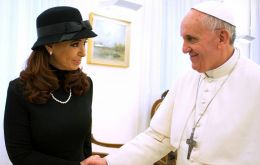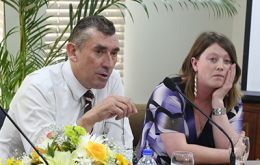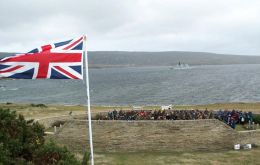MercoPress. South Atlantic News Agency
Tag: Falkland Islands
-
Monday, March 18th 2013 - 21:51 UTC
Falkland Islands’ post referendum musings and the ‘Britishness’ feeling

Writing for Penguin News its Deputy Editor, John Fowler, takes stock in the wake of the recent referendum in the Falkland Islands which resulted in a 92%turn out and 99.8% of voters opting to maintain the Islands current status as an overseas territory of Great Britain.
-
Monday, March 18th 2013 - 18:49 UTC
Falklands’ dispute: ‘the Vatican is no arbitrage tribunal for international affairs’

The Pope has no reason to intervene in the Falklands/Malvinas dispute, since the Vatican is not an international tribunal and there is no imminence of a war, according to Rodolfo Terragno an Argentine lawyer and former head of cabinet, minister and congressman.
-
Monday, March 18th 2013 - 18:01 UTC
Falklands’ dispute: Cristina Fernandez asks the Pope for this ‘holy intervention’

Argentine President Cristina Fernández revealed she asked Pope Francis for his “holy intervention” regarding the Falklands/Malvinas case, during the meeting held Monday in the Vatican which was followed by lunch.
-
Monday, March 18th 2013 - 08:22 UTC
“The people of the Falklands have spoken clear and loud”, MLA Hansen tells Trinidad and Tobago

The Falkland Islands have spoken, and have spoken clearly and loud for all countries in the world to listen, said Ian Hansen, member of the elected Falkland Islands Legislative Assembly currently on a tour of Caribbean countries to deliver the message from the March 10/11 referendum.
-
Monday, March 18th 2013 - 07:38 UTC
“Britain, Argentina need to find a political solution”, says Gulf News from UAE

The following editorial on the Falkland Islands issue was published by the United Arab Emirates Gulf News.
The referendum by the 2,500 inhabitants of the British-administered Falkland Islands has not contributed to finding a political solution to the dispute between Britain and Argentina that has run for centuries. -
Monday, March 18th 2013 - 07:04 UTC
“Argentina should accept the near-unanimity of the Falklanders”

Canada’s Globe and Mail had an editorial on the Falklands referendum.
Not since the halcyon days of the Soviet Union has a vote been so lopsided, but there was no fraud or coercion. Ninety-two per-cent turnout; over 98% support for the Falkland Islands to retain its status as a British Overseas Territory. -
Monday, March 18th 2013 - 06:50 UTC
Malvinas Islands claim, an act of “epic stupidity” says El Pais from Madrid

John Carlin, the British writer and journalist who works for Spain’s leading newspaper El Pais, with a high degree of irony strongly criticized Argentina’s claim over the Falklands/Malvinas Islands as an ‘epic idiocy’.
-
Saturday, March 16th 2013 - 03:43 UTC
Falklands: PM Cameron anticipates Argentina’s intention of having Francis involved in the dispute

British Prime Minister David Cameron stated on Friday that Pope Francis had been wrong to say last year that Britain had “usurped” the Falkland Islands from Argentina, saying he respectfully disagreed with the new Pontiff. His words have been interpreted as a message anticipating the Argentine government’s possible attempts to get the new pope involved in the dispute.
-
Friday, March 15th 2013 - 02:21 UTC
Falklands’ current cruise season much quieter and rather ‘turbulent’

This year’s Falkland Islands season has been much quieter than usual with over 19.000 passengers to the first week of March mainly because of cancellations due to weather and technical issues with a handful related to the political situation created by Argentine harassment early on the season, according to industry sources in the Islands.
-
Thursday, March 14th 2013 - 09:23 UTC
Falkland Islands’ referendum message to Argentina: “intimidation of Islanders must cease”

The Argentine government demands to control the Falkland Islands against the wishes of the people who live there are fundamentally incompatible with modern democratic values and attempts to intimidate the Islanders must cease, said Foreign Secretary William Hague in an update to Parliament.
